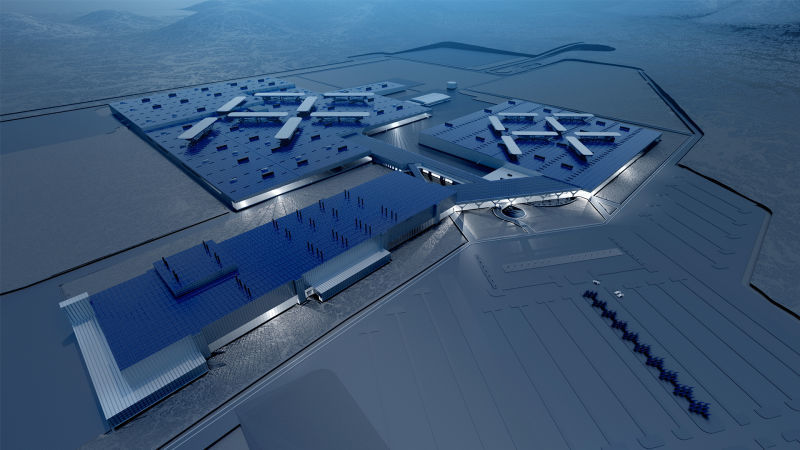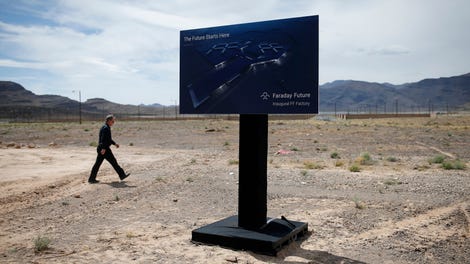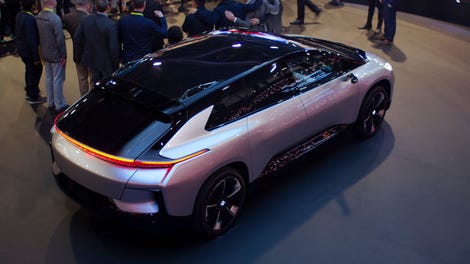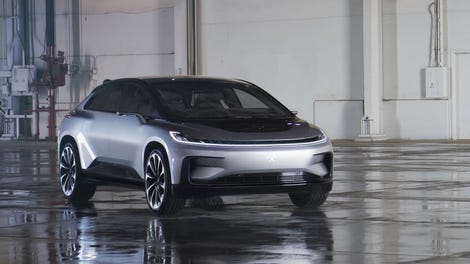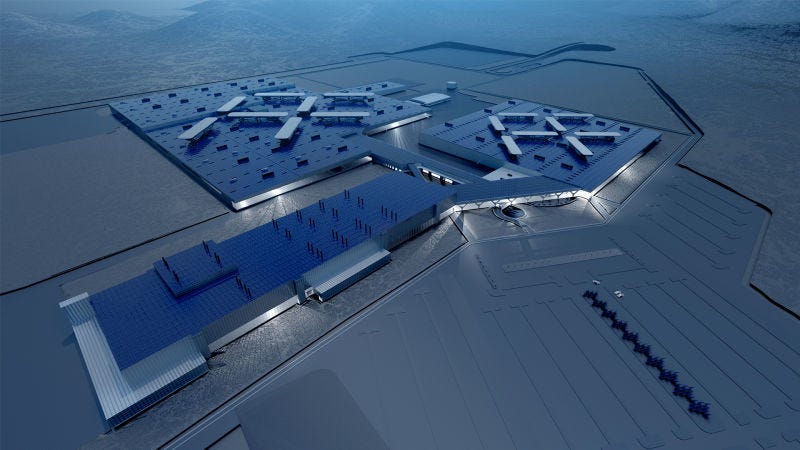
Ambitious but troubled startup automaker Faraday Future said today that it’s officially halting efforts to build a $1 billion factory in Nevada, as its billionaire financier Jia Yueting deals with significant money problems. The move comes just days after Faraday officials told Jalopnik that Jia’s financial woes will have “no impact” on Faraday’s day-to-day operation and goal of producing its flagship vehicle, the FF 91, by 2018.
The deal to bring Faraday to Nevada included a $335 million tax incentive package for the start-up, which estimated the auto factory would’ve spurred some 13,000 jobs across Southern Nevada. State officials reportedly said Monday that no public money will be lost on the venture, as the majority of planned infrastructure projects around the site had yet to commence.
Advertisement
In a statement to The Nevada Independent, which broke the news Monday, Faraday’s chief financial officer, Stefan Krause, said the start-up is now planning to shift its business strategy, amid a push to raise $1 billion for its long-term goals.
Advertisement
“We have decided to put a hold on our factory at the Apex site in North Las Vegas. We remain committed to the Apex site in Las Vegas for long-term vehicle manufacturing,” Krause said in the statement, which was confirmed by Faraday.
The company told Jalopnik in a statement that its business strategy will now focus on positioning “the company as the leader in user-ship personal mobility—a vehicle usage model that reimagines the way users access mobility.”
Advertisement
They added: “As a result of this shift in direction, we are in the final stages of confirming a new manufacturing facility that presents a faster path to start-of-production and aligns with future strategic options,” the statement said.
Your guess is as good as mine on what “user-ship personal mobility” means. The remark seems to suggest something along the lines of a ride-sharing service.
Faraday’s long-term prospects have been in question since last month, when Jia and his tech conglomerate LeEco announced a significant reduction of that company’s U.S. operations. Last week, a Chinese court froze $182 million of Jia’s assets, spurring Jia to issue a plea to LeEco’s creditors for more time to repay debts. Jia said he had resigned from a number of positions at LeEco to focus entirely on building electric cars, particularly the FF 91, but it’s unclear if his plan includes focusing on LeEco’s own electric vehicle, the LeSee.
Advertisement
The Independent reports that Faraday’s looking to close a deal on one of a few potential sites, likely in California and Nevada, with the hope of launching production in the near-term future to and begin selling the FF 91 by the end of 2018.
Nevada’s Citizens Held ‘Harmless’ In Deal
The announcement doesn’t come without disappointment for Faraday. In January, the company held a glitzy presentation at the CES Conference in Las Vegas to debut the FF 91, which failed to conduct an auto-park demonstration on stage—an embarrassing moment after a puzzling CES presentation by FF a year prior.
Advertisement
The company has received intense scrutiny by Nevada officials, including the state’s treasurer, for a tax incentive deal that has been mired in controversy. Dan Schwarz, the state treasurer, has called for an audit of the deal and previously referred to Faraday as a Ponzi scheme.
Advertisement
The $335 million incentive package—including $215 million in tax credits, contingent on completion of the $1 billion factory, and upward of $175 million in publicly-funded infrastructure near the site—dates to late 2015, when the Nevada legislature passed laws during special sessions to authorize the Faraday deal. To date, Faraday has spent at least $160 million at the site—which was expected to be the location for the start-up’s 3-million square foot factory—mostly by moving dirt around and building some new sewer infrastructure.
But without a $1 billion factory in place, the public’s contribution to the project is negligible, according to a statement from Steve Hill, director of the Nevada Governor’s office of economic development. The money went into a trust fund, maintained by the state, that would’ve been released to Faraday upon completion of the project.
Advertisement
“Throughout the process of working with Faraday, the state recognized both the opportunity a large manufacturing facility could provide as well as the inherent risk associated with a start-up company attempting this endeavor,” Hill said in a statement Monday. “In order to completely protect the citizens of Nevada from risk, the agreement with Faraday requires the company to fully invest a minimum of $1 billion in order to receive any state incentives.”
“In accordance with this agreement,” Hill went on, “Faraday has paid all taxes owed to a Trust Fund established by the state. The agreement with Faraday held Nevada’s citizens harmless from the risk associated with this project.”
The Independent reports that Faraday has received about $605,000 in tax abatement to date, and Hill told the news outlet that abated taxes from the trust fund will be distributed to their original sources. Hill also plan to ask Faraday to repay $2,500 in payroll tax abatements, according to the Independent.
Advertisement
Advertisement
Making cars isn’t easy, and the industry can always benefit from new players, but Faraday’s short history has been plagued by financial and operational issues from the outset—problems all the hype in the world could never resolve.
Whatever the case, Faraday says it’ll continue to push ahead toward its new goal of reimagining the way people access “mobility”—an industry euphemism that doesn’t mean anything.
“More details on Faraday Future’s new strategy will be shared in the coming weeks,” Otto said.

